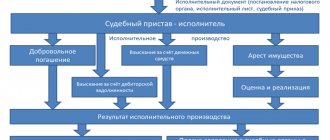The inspectorate informs about the debt
The tax authority, having identified arrears, sends the individual a demand to pay taxes, fees, penalties, fines, and interest. The debtor is obliged to fulfill this requirement within the following terms (letter of the Federal Tax Service of Russia dated October 21, 2015 No. GD-4-8/ [email protected] ):
- when sent to a taxpayer through branches of the Federal Tax Service of the Federal Tax Service of the Federal Institution of Russia in a constituent entity of Russia - no less than 30, but no more than 45 calendar days;
- in all other cases (for example, when the demand is delivered in person against a signature or sent by registered mail) - 30 calendar days.
If the deadline has expired and the debtor has not fulfilled the demand, the inspectorate calls the debtor and informs him about the existence of the debt. The Federal Tax Service of Russia, in a letter dated October 21, 2015 No. GD-4-8/ [email protected] , specifies that inspectors will call only if the amount of debt is more than 10,000 rubles, and for Moscow, the Moscow region and St. Petersburg - more 50,000 rubles.
The debtor can only be disturbed during working hours – from 8 a.m. to 8 p.m. After the deadline for fulfilling the payment requirement has expired, but no later than one month from the date of expiration of this period, the inspectorate informs the employer (if information is available from the tax authority) about the employee who has tax arrears.
Legal analysis of the letter from the Federal Tax Service of Russia on the issue of payment of insurance premiums by lawyers
Letter of the Federal Tax Service of Russia dated September 1, 2021 No. BS-4-11/ [email protected] “On determining the period for the beginning (completion) of the activities of lawyers, as well as the period for suspending the status of a lawyer for the purpose of forming obligations for insurance premiums.”
The Federal Tax Service of Russia clarified that in order to correctly formulate insurance premium obligations by tax authorities, the period of commencement (completion) of the activities of lawyers, as well as the period of suspension (resumption) of the status of a lawyer, must be calculated from the moment the corresponding decision is made by the council of the bar chamber of the constituent entity of the Russian Federation
[1]
.
A legal analysis of this document leads to the conclusion that this clarification does not fully comply with the Tax Code of the Russian Federation (hereinafter referred to as the Tax Code of the Russian Federation).
One can agree with the conclusion of the Federal Tax Service of Russia only in a situation of suspension (resumption) of the status of a lawyer, when the taxpayer is not removed from tax registration (clause 6 of Article 84 of the Tax Code of the Russian Federation). In this case, on the basis of clause 7 of Art. 430 of the Code, payers of insurance premiums do not calculate and pay insurance premiums for compulsory pension insurance and compulsory medical insurance, in particular for periods in which the status of a lawyer is suspended and during which they did not carry out the corresponding activities[2].
For the final conclusion, the Federal Tax Service of Russia used the provisions of the Tax Code of the Russian Federation and the Federal Law of May 31, 2002 No. 63-FZ “On advocacy and the legal profession in the Russian Federation.”
The Federal Tax Service of Russia names several dates and periods used in legislation:
– the moment of assignment of the status of a lawyer and the moment of termination of the status of a lawyer (clause 7 of Article 430 of the Tax Code of the Russian Federation);
– the day the applicant takes the oath of attorney (Clause 1, Article 12 of the Federal Law of May 31, 2002 No. 63-FZ);
– the qualification commission, within seven days from the date of taking the oath by a person who has successfully passed the qualification exam, notifies the territorial body of justice about the assignment of the status of lawyer to the applicant and the taking of the oath, which, within a month from the date of receipt of the notification, enters information about the lawyer into the regional register and issues the lawyer the corresponding certificate (Clause 1, Article 15 of Federal Law No. 63-FZ).
An analysis of the initial provisions of the legislation and the final conclusion of the Federal Tax Service of Russia indicates that the tax department preferred the earliest date of all possible options, which indicates an arbitrary and budgetary approach of the tax department
.
We cannot agree with this explanation for the following reasons.
The explanation of the Federal Tax Service of Russia contradicts the Tax Code of the Russian Federation
Based on the provisions of Art. 430 of the Tax Code of the Russian Federation, the obligation of insurance premium payers is directly related to only one circumstance: the implementation of entrepreneurial or other professional activities of its payer.
It is obvious that the decision of the council of the bar association of a constituent entity of the federation is not yet sufficient for the insurance premium payer to start practicing as a lawyer.
According to sub. 2) clause 4 art. 430 of the Tax Code of the Russian Federation, the calendar month of commencement of activity for a lawyer is the calendar month in which the lawyer is registered with the tax authority.
According to paragraph 5 of Art. 430 of the Tax Code of the Russian Federation, if payers cease to carry out entrepreneurial or other professional activities during the billing period, the corresponding fixed amount of insurance premiums payable by them for this billing period is determined in proportion to the number of calendar months up to the month in which the lawyer is deregistered with the tax authorities.
From the above it is clear that the interpretation of the Federal Tax Service of Russia of the provisions of the Tax Code of the Russian Federation significantly diverges from the text of the Tax Code of the Russian Federation: the date of commencement of the performance of tax duties by a lawyer, according to the letter of the Federal Tax Service of Russia dated September 1, 2021 No. BS-4-11 / [email protected] , is obviously coming earlier than the date established in sub. 2) clause 4 art. 430 Tax Code of the Russian Federation
.
Consequently, in violation of the provisions of Art. 1, 4 and 6 of the Tax Code of the Russian Federation, the tax department limited the rights of lawyers - taxpayers, defined in the Tax Code of the Russian Federation.
The explanations of the Federal Tax Service of Russia contradict the previous official legal position of this department, proclaimed in a specific tax dispute
The decision of the Federal Tax Service of Russia dated February 4, 2021 No. SA-4-9/ [email protected] considered the complaint of a taxpayer - a lawyer, insisting that for the purposes of calculating insurance premiums, the moment of termination of the status of a lawyer is the date of adoption of the corresponding decision by the council of the bar chamber .
Rejecting the applicant’s arguments, the Federal Tax Service of Russia referred to the provisions of paragraph 3 of Art. 420, paragraph 1, art. 430 and paragraph 5 of Art. 430 of the Tax Code of the Russian Federation, according to which the termination of a lawyer’s professional activity for the purposes of taxation of insurance premiums is determined by the month in which the lawyer is deregistered with the tax authority.
According to the provisions of Art. 84 of the Code, the basis for registering, as well as deregistering, lawyers with the tax authorities is information received from the bar chambers of the constituent entities of the Russian Federation. The specified information is submitted by the bar chambers of the constituent entities of the Russian Federation in Form A “Information about the lawyer”, approved by order of the Federal Tax Service of September 17, 2007 No. MM-3-09/ [email protected]
At the same time, this information contains information about the status of lawyers (section 2 of Form A) with details of the decision of the council of the bar chamber, as well as information about the order of the territorial body of the Ministry of Justice of the Russian Federation on entering information about lawyers into the register / exclusion from the register (section 3 Form A) with details of the relevant order.
Taking into account that in accordance with the Procedure for maintaining registers of lawyers of the constituent entities of the Russian Federation, approved by order of the Ministry of Justice of the Russian Federation dated April 23, 2014 No. 85 (hereinafter referred to as the Procedure), in entering information about a lawyer into the regional register in connection with the assignment (termination) of the status of a lawyer may be refused on the grounds established by Ch. V of the Procedure, then in order to register (deregister) a lawyer, the tax authorities use the date of the order of the territorial body of the Ministry of Justice of the Russian Federation
.
According to the Federal Tax Service of Russia, set out in this decision, this does not contradict the established procedure for deregistering a taxpayer as a lawyer with the tax authority.
The interpretation of the Russian Federal Tax Service of the unclear norms of the Tax Code of the Russian Federation contradicts the rule of paragraph 7 of Art. 3 Tax Code of the Russian Federation
From the above it follows that at different times the Federal Tax Service of Russia answered the same question in different ways (came to opposite conclusions), giving different interpretations of different tax rules that, in the opinion of the Federal Tax Service, regulate the same tax legal relations.
As indicated in the letter of the Federal Tax Service of Russia dated September 1, 2021 No. BS-4-11/ [email protected] , clarifications were given in connection with incoming requests from the departments of the Federal Tax Service of Russia for the constituent entities of the Russian Federation. Consequently, the Federal Tax Service has doubts related to the unclear provisions of the legislation on the issue of the beginning and termination of the duties of the payer of insurance premiums by lawyers.
The letter of the Federal Tax Service of Russia dated September 1, 2021 No. BS-4-11 / [email protected] cannot be called a correct elimination of this ambiguity, since the tax department did not apply the provisions of Art. 430 of the Tax Code of the Russian Federation, directly related to the issue under consideration (see above).
If we consider such doubt about the ambiguity of an act of legislation to be irremovable, then by virtue of clause 7 of Art. 3 of the Tax Code of the Russian Federation, it must be interpreted in favor of the taxpayer (tax payer, insurance premium payer, tax agent).
Since the good faith behavior of the taxpayer is presumed, and the possibility of abuse of the lawyer in these matters is impossible (see below), the guidance of this rule seems justified.
It is obvious that in the letter of the Federal Tax Service of Russia dated September 1, 2021 No. BS-4-11 / [email protected] the legal principle of resolving such legal conflicts is violated.
What to do?
1. Appeal the letter of the Federal Tax Service of Russia dated September 1, 2021 No. BS-4-11 / [email protected] in court.
In Resolution No. 6-P dated March 31, 2015, the Constitutional Court of the Russian Federation supported the right of taxpayers to appeal in court letters from the Federal Tax Service of Russia affecting their tax rights.
In its decision, the Constitutional Court of the Russian Federation confirmed its previous legal position[3] that:
– when considering such cases, arbitration courts do not have the right to limit themselves to formally establishing that the procedure and form for adopting the act under appeal have been observed (or not observed);
– they are obliged to find out whether the act being appealed affects the rights of taxpayers, whether it complies with the acts of legislation on taxes and fees, and in each specific case it is possible to ensure the effective restoration of violated rights;
– otherwise would mean an unjustified denial of judicial protection, which is contrary to Art. 46 of the Constitution of the Russian Federation.
In pursuance of this resolution, the CAS of the Russian Federation has been supplemented with a special article (see Article 217.1. Consideration of administrative cases challenging acts containing clarifications of legislation and having regulatory properties).
In the letter of the Federal Tax Service of Russia dated September 1, 2021 No. BS-4-11/ [email protected] the Departments of the Federal Tax Service of Russia for the constituent entities of the Russian Federation are ordered to bring it to the lower tax authorities. Consequently, the tax authorities will be guided by it in their current activities.
In order to eliminate legal uncertainty and minimize tax risks, lawyers can consolidate with the help of regional and federal chambers and at the same time submit applications to the Supreme Court of the Russian Federation to challenge the letter. This is better than if everyone then fights off fines from their inspectorate alone.
2. Do not be guided by the letter of the Federal Tax Service of Russia dated September 1, 2021 No. BS-4-11/ [email protected]
It should be remembered that according to sub. 11) clause 1 art. 21 of the Tax Code of the Russian Federation, taxpayers have the right not to comply with unlawful acts and demands of tax authorities, other authorized bodies and their officials that do not comply with this Code or other federal laws.
According to Part 2 of Art. 120 of the Constitution of the Russian Federation, in the event of a judicial tax dispute on determining the period for the beginning (completion) of the activities of lawyers, as well as the period for suspending the status of a lawyer in order to form obligations for insurance premiums, the court, having established during the consideration of the case that the act of a state body does not comply with the law, is obliged to make a decision in accordance with the law .
Last question: Can lawyers abuse their rights for insurance premium purposes?
It appears that such a risk is minimal (if at all possible).
Firstly, in the procedure for tax registration and deregistration, the subjective will of the lawyer himself is absent: all necessary actions are carried out by the qualification commission, the council of the bar association of a constituent entity of the Russian Federation, and the territorial body of justice.
Secondly, for the purposes of levying insurance premiums, the legislator uses a unit of time such as a month, while the deadlines established for the above-mentioned subjects are calculated in days.
Thirdly, to actually practice law, a lawyer needs a document confirming his legal status. But the lawyer’s certificate is issued by the same government body (the Ministry of Justice) that is responsible for the timely registration of the lawyer with tax authorities and his deregistration. Consequently, the period of activity of the lawyer for the purposes of paying insurance premiums depends only on the promptness of the actions of the bodies specified in the law (and not on the lawyer).
[1] The text coincides with the text of the Letter of the Federal Tax Service of Russia dated January 23, 2020 No. BS-4-11 / [email protected] “On determining the period of beginning (completion) of the activities of lawyers, as well as the period of suspension of the status of a lawyer in order to form obligations under insurance contributions."
[2] See about this Letter of the Federal Tax Service of the Russian Federation dated November 1, 2021 No. GD-3-11 / [email protected] “On the direction of the response.”
[3] See the rulings of the Constitutional Court of the Russian Federation of November 5, 2002 No. 319-O, of October 20, 2005 No. 442-O and of April 3, 2007 No. 363-O-O.
The tax authority files a lawsuit
If pre-trial collection measures are unsuccessful, the inspectorate submits applications to the court for the collection of taxes, fees, penalties, and fines from the property of an individual. This is done within the following time frame (letter of the Federal Tax Service of Russia dated October 21, 2015 No. GD-4-8/ [email protected] ):
- within 4 months from the day when the total amount of taxes, fees, penalties, fines to be collected exceeded 3,000 rubles and for which applications for collection were not previously sent to a court of general jurisdiction;
- within 3 months from the date of expiration of the three-year period from the date of expiration of the deadline for fulfilling the earliest demand for payment of taxes, fees, penalties, fines, taken into account by the tax authority when calculating the total amount of tax, fees, penalties, fines to be recovered from an individual, in case if such amount of taxes, fees, penalties, fines does not exceed 3,000 rubles.
Federal Tax Service on the procedure for collecting damages from individuals for tax arrears of companies
On January 12, the Federal Tax Service of Russia sent a letter to its territorial bodies for information and use in their work, which explains the procedure for applying the conclusions contained in the Resolution of the Constitutional Court of the Russian Federation of December 8, 2017 No. 39-P.
As AG previously wrote, in this resolution the Constitutional Court of the Russian Federation checked the provisions of Art. 15, paragraph 1, art. 1064 Civil Code of the Russian Federation and sub. 14 clause 1 art. 31 of the Tax Code of the Russian Federation, regulating legal relations related to the collection of tax arrears of organizations from individuals. The applicants of the complaints, combined into one case, indicated that the norms they challenged contradict the fundamental law, since they allow the court, on claims of tax authorities, to recover from individuals brought to criminal liability for committing tax crimes, damage caused to the state by non-payment of taxes not by them, but by organizations , the officials of which they were, as well as due to the uncertainty of the concept of “harm” contained in the legislation, make it possible to equate the amount of taxes unpaid by the organization with the harm caused by an individual.
The Constitutional Court of the Russian Federation found the contested legal provisions consistent with the Constitution, but at the same time clarified their constitutional and legal meaning, in particular, pointing out the inadmissibility of double collection of tax arrears.
As noted in the letter from the Federal Tax Service, when tax authorities apply the conclusions of the Constitutional Court, it is necessary to take into account that the decisions and legal positions formulated by it apply to legal relations when bringing to tort liability individuals who have been convicted of committing tax crimes related to non-payment of taxes by an organization, or in in respect of whom criminal prosecution in connection with the commission of such crimes was terminated on non-rehabilitative grounds. In this regard, the Federal Tax Service of Russia reminds that the tax authorities, along with the claims directly mentioned in Art. 31 of the Tax Code of the Russian Federation, has the right to bring claims for compensation for damage on the basis of Art. 1064 of the Civil Code of the Russian Federation to such individuals who were convicted of committing tax crimes that caused these arrears, or whose criminal prosecution in connection with the commission of such crimes was terminated on non-rehabilitative grounds. “This right of the tax authorities is due to the emergence of civil legal relations between the tortfeasor who committed actions that resulted in the impossibility of fulfilling tax obligations directly by the taxpayer or their forced execution within the framework of tax legal relations, and the victim - a public legal entity. The restoration of the violated right of a public legal entity is ensured by the legal tools of civil law,” the letter states.
In a situation where a criminal case against an individual is terminated on non-rehabilitative grounds, and the tax authority files a claim against such person in court for compensation for damage in accordance with Art. 1064 of the Civil Code of the Russian Federation, the grounds for bringing tort liability are established by the court in civil proceedings. The Federal Tax Service draws the attention of the tax authorities to the fact that the conclusions of the Constitutional Court of the Russian Federation on the need to prove the elements of a civil violation and an additional study of all the circumstances regarding the tort in a separate trial do not apply to cases of resolving the issue of a civil claim simultaneously with the pronouncement of a verdict against an individual , as well as the presence of a court verdict that has entered into force. In this case, the rules on the prejudicial nature of the circumstances established by the verdict apply.
It is indicated that, taking into account the position of the Constitutional Court of the Russian Federation, special attention must be paid to evidence of the involvement of the individual held accountable in the economic activities of the organization and influence on its actions. Since the Court did not consider the constitutionality of paragraph 2 of Art. 1064 of the Civil Code of the Russian Federation and previously it expressed the position that there are no grounds for recognizing its provisions as violating the constitutional rights of citizens; in civil suits, tax authorities must point out the presumption of guilt of the harm-doer, since by virtue of this norm the burden of proving the absence of guilt is placed on the defendant.
The letter emphasizes that it is necessary to exclude situations of double recovery of damages: once from a legal entity in accordance with tax legislation, and secondly from an individual in accordance with civil law. The Federal Tax Service also indicates that bringing an individual to civil liability for damage caused to a public legal entity in the amount of taxes of the taxpayer organization subject to credit to its budget, arising as a result of the criminally unlawful actions of this person, is possible only if legal rights have been exhausted or are absent. grounds for applying the mechanisms provided for by law to satisfy tax claims at the expense of the organization itself or persons held liable for its debts in the manner prescribed by current legislation.
The Chairman of the Sazonov and Partners Agency, Vsevolod Sazonov, approved the restrictive approach expressed by the Federal Tax Service of Russia to the possibility of collecting arrears from individuals on taxes and fees of organizations. In his opinion, the implementation of the indication of the need to prioritize the collection of tax arrears of an organization from itself in practice should minimize the possibility of “double collection”.
The expert also drew attention to a small but significant instruction from the Federal Tax Service that the amount of a fine for committing a tax offense cannot be recovered from an individual upon claims of the Federal Tax Service. “Thus, the commented letter, one way or another, contains a number of relevant clarifications, which, if properly applied, should certainly streamline law enforcement practice on the issue of collecting tax debts of an organization from individuals,” concluded Vsevolod Sazonov.
A different opinion was expressed by Valentin Moiseev, partner, head of the Taxes practice at Andrey Gorodissky and Partners. He believes that the letter in question from the Federal Tax Service is aimed, in essence, at “emasculating” the positions of the Constitutional Court, which protect individuals from the imposition of overwhelming, obviously unfulfillable obligations on them.
According to Valentin Moiseev, the main points that the Federal Tax Service conveys to territorial inspectorates are the presumption of guilt of an individual against whom the tax authority is suing for compensation for damage caused by a tax crime, and the statement that the amount of damages to be compensated cannot be reduced, despite the position of the Constitutional Court, taking into account its property status.
The lawyer also noted the position of the Federal Tax Service that the damage must be recovered from the tortfeasor even if his enrichment as a result of a tax crime is not proven, and the very fact of enrichment must be proven by tax inspectorates using almost any indirect evidence, including an increase in the well-being of relatives.
As Valentin Moiseev explained, such a strict approach of the Federal Tax Service is not news - previously the tax service has already directed lower-level inspectorates to the most active collection of tax arrears from controlling persons, but within the framework of bankruptcy procedures and subsidiary liability (Letter of the Federal Tax Service of Russia dated August 16, 2017 No. SA -4-18/ [email protected] ).
The expert emphasized that the attention of the Federal Tax Service to issues related to criminal prosecution for tax crimes is no coincidence. He recalled that in mid-2021, the Federal Tax Service of Russia published joint guidelines with the Investigative Committee, in which, as AG wrote, the main attention was paid to the efforts of tax officials to prove intent to commit tax crimes.
According to Valentin Moiseev, in this regard, we should expect an increase in the number of cases when a criminal case is initiated primarily for the purpose of collecting tax arrears from the accused, and the phrase about the “exclusivity” of this mechanism should not be misleading. “The joint efforts of the Federal Tax Service and investigative authorities, aimed at coordinating interdepartmental interaction, will also contribute to an increase in the number of criminal cases under “tax” articles. Taking into account the approach of the Supreme Court formulated back in 2006, it is necessary to understand that the subjects of such liability can be not only the general director and the chief accountant, but also persons who “assisted in the commission of the crime,” including persons who actually control the taxpayer, lawyers and consultants of the taxpayer,” – the lawyer thinks.
Seizure of property and ban on traveling abroad
The inspectorate forwards the judicial act on tax collection that has entered into force to the Federal Bailiff Service. Further, the tax is collected in accordance with the Federal Law of October 2, 2007 No. 229-FZ “On Enforcement Proceedings” (clause 4 of Article 48 of the Tax Code of the Russian Federation). Along with the judicial act, the following are sent to the bailiff service:
- a petition to seize the debtor’s property - if the amount of taxes, fees, penalties, fines exceeded 3,000 rubles;
- application for a temporary restriction on the debtor’s departure from the Russian Federation - if the amount of debt exceeds 10,000 rubles.
In addition, if the inspection has information about the debtor’s accounts and his property, this information is also sent to the bailiffs.
Collection of penalties and fines for non-payment of taxes
NK Your Tax Representative LLC answers readers’ questions. Telephones in Yekaterinburg: 378-33-29, 378-33-56, 213-59-35
Our organization was assessed penalties for failure to pay taxes on time and fines under an audit report in 1996. Since then they have not been paid. There were no deferred payments for these accruals.
Is there a statute of limitations for such accruals, and does the Tax Inspectorate have the right to remove them from the organization in an indisputable manner at the present time?
(OJSC, Kamensk-Uralsky)
The procedure for forced collection by the tax authority of amounts of tax and penalties at the expense of the funds of the taxpayer - organization is determined by Art. 46 Tax Code of the Russian Federation
.
Collection is carried out by decision of the tax authority by sending to the bank in which the taxpayer's accounts are opened, a collection order to write off and transfer to the relevant budgets (extra-budgetary funds) the necessary funds from the taxpayer's accounts.
According to paragraph 3 of Art. 46 Tax Code of the Russian Federation
the decision on collection can be made
no later than 60 days after the expiration of the deadline for fulfilling the requirement to pay the tax
.
Thus, the Tax Code of the Russian Federation allows for the undisputed collection of tax arrears in relation to organizations, but only within the specified period.
A decision on collection made after the expiration of the 60-day period is considered invalid and cannot be enforced.
In this case, the tax authority is given the right to file a claim in court to recover the amount of tax due from the taxpayer.
, that is, a judicial collection procedure is established.
At the same time, paragraph 3 of Art. 46 Tax Code of the Russian Federation
does not establish a period within which such an appeal must be made.
Resolution of the Plenum of the Supreme Arbitration Court of the Russian Federation dated February 28, 2001 No. 5 “On some issues of application of part one of the Tax Code of the Russian Federation” (clause 12)
It is explained that when considering such cases, courts should proceed from the universality of the will of the legislator, expressed in
paragraph 3 of Art.
48 of the Tax Code of the Russian Federation regarding the limitation period for collecting in court amounts of tax arrears, and be guided by the corresponding provision when considering claims for the collection of arrears from legal entities.
Thus, a statement of claim for collection of arrears from a legal entity can be filed by the tax authority with the Arbitration Court within six months from the expiration of the 60-day period provided for in paragraph 3 of Art. 46 Tax Code of the Russian Federation
for the undisputed collection of the appropriate amounts.
At the same time, the court indicated that this period is preemptive, that is, not subject to restoration.
If it is missed, the court refuses to satisfy the demands of the tax authority against the legal entity.
As for penalties, Art. 115 Tax Code of the Russian Federation
a 6-month statute
has been established for the tax authority to file a claim in court for their recovery, calculated
from the date of discovery of the tax offense and the drawing up of the corresponding act
.
Based on the foregoing, the tax authority is deprived of the right to collect tax arrears and the amount of penalties under the 1996 audit report.
It should be noted that despite the impossibility of collecting the arrears incurred in 1996 by the tax authority, the tax authority also has no grounds for writing it off.
Yes, Art. 59 Tax Code of the Russian Federation
it has been established that arrears, the collection of which turned out to be impossible due to economic, social or legal reasons, are recognized as hopeless and written off in the manner established:
– for federal taxes and fees – by the Government of the Russian Federation;
– for regional and local taxes and fees – by the executive bodies of the constituent entities of the Russian Federation and local self-government, respectively.
The Government of the Russian Federation, by its resolution No. 100 dated February 12, 2001, “On the procedure for declaring uncollectible and writing off arrears and debts for penalties on federal taxes and fees”
has determined an exhaustive
list of grounds for write-off
, namely the following:
– liquidation of the organization;
– declaring an individual entrepreneur bankrupt;
– death or declaration of death of an individual.
Arbitration practice mainly proceeds from the position that recognition of arrears as hopeless for collection is not the responsibility of the tax authorities, since it is not listed as such in Art. 32 Tax Code of the Russian Federation
(Resolution of the Federal Antimonopoly Service No. F09-4021/03-AK dated November 25, 2003, No. F09-2233/04AK dated June 7, 2004).
Moreover, in a number of cases, courts generally refuse to recognize the right of taxpayers to demand that the tax authority recognize the arrears as hopeless and write them off, since Art. 24 Tax Code of the Russian Federation
and other acts of legislation on taxes and fees do not provide for such a right (Resolution of the Federal Antimonopoly Service No. F09-3010/03-AK dated September 18, 2003, No. F09-3042/03-AK dated September 18, 2003).
the tax is canceled today
, according to which the tax authority made an additional assessment in 1996, and the corresponding act of legislation on taxes and fees, which abolished this tax, has retroactive effect, then according to
paragraph 4 of Art.
5 of the Tax Code of the Russian Federation, the organization
has no obligation to pay this tax
.
These, as well as other circumstances affecting the legality of the fact that the amount of arrears on taxes (fees) are reflected on the taxpayer’s personal account, may be grounds for the court to recognize as illegal the inaction of the tax authority, expressed in the refusal of the taxpayer to write it off (resolution of the Federal Antimonopoly Service dated June 18, 2003 No. F09-1712/03-AK).
Regarding the write-off of debt under tax sanctions
, accrued before 01/01/1999, it should be noted that, in accordance with Art.
32.2 of the Federal Law of 05.08.2000 No. 118-FZ “On the introduction into force of part two of the Tax Code of the Russian Federation and amendments to certain legislative acts of the Russian Federation on taxes” (as amended on 12.23.2003) if it is impossible collection of amounts of tax sanctions for violations of the legislation of the Russian Federation on taxes and fees, which before the entry into force of the Tax Code of the Russian Federation were levied in an indisputable manner, and for which the decision of the tax authority was made before 01/01/1999, such amounts are considered hopeless for collection and are written off
in the manner provided for in
paragraph 1 of Art.
59 Tax Code of the Russian Federation .
Deputy Director of LLC "NK Your Tax Representative"
D.V. Merkushev
© LLC “NK Your Tax Representative”
Joint raids: traffic police, inspection, bailiffs
Tax authorities form lists of debtors with debts of more than 50,000 rubles for property taxes, more than 250,000 rubles for personal income tax, which are being executed by the bailiff service and organize joint raids to seize the debtor’s property.
In addition, together with the territorial bodies of the Federal Bailiff Service and the State Road Safety Inspectorate of the Ministry of Internal Affairs of the Russian Federation, tax authorities participate in raids to collect debts on property taxes from individuals in the most visited public places (airports, large retail outlets, etc. .d.).
Contact your employer
If the debtor does not have property that could be seized, bailiffs turn to the employer to seize wages and other periodic payments. The employer must transfer part of the debtor employee’s salary to the budget to pay off the employee’s tax debt.
Professional press for accountants
For those who cannot deny themselves the pleasure of leafing through the latest magazine and reading well-written articles verified by experts. Select a magazine >>





